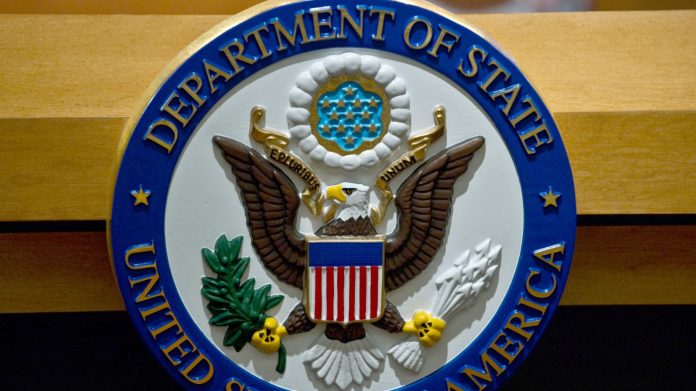The State Department releases the Country Reports on Human Rights Practices annually.
Nicholas Kamm/Getty Images
hide caption
toggle caption
Nicholas Kamm/Getty Images
The Trump administration is substantially scaling back the State Department’s annual reports on international human rights to remove longstanding critiques of abuses such as harsh prison conditions, government corruption and restrictions on participation in the political process, NPR has learned.
Despite decades of precedent, the reports, which are meant to inform Congressional decisions on foreign aid allocations and security assistance, will no longer call governments out for such things as denying freedom of movement and peaceful assembly. They won’t condemn retaining political prisoners without due process or restrictions on “free and fair elections.”
Forcibly returning a refugee or asylum seeker to a home country where they may face torture or persecution will no longer be highlighted, nor will serious harassment of human rights organizations.
According to an editing memo and other documents obtained by NPR, State Department employees are directed to “streamline” the reports by stripping them down to only that which is legally required. The memo says the changes aim to align the reports with current U.S. policy and “recently issued Executive Orders.”
Officially called “Country Reports on Human Rights Practices,” the annual documents are required, by statute, to be a “full and complete report regarding the status of internationally recognized human rights.”
Human rights defenders say the cuts amount to an American retreat from its position as the world’s human rights watchdog.
“What this is, is a signal that the United States is no longer going to [pressure] other countries to uphold those rights that guarantee civic and political freedoms – the ability to speak, to express yourself, to gather, to protest, to organize,” said Paul O’Brien, executive director of Amnesty International, USA.
A spokesperson for the State Department declined to comment on the memo or the human rights reports. NPR confirmed the memo’s authenticity with two sources close to the process.
The reports, released in March or April most years, are highly anticipated by foreign leaders and diplomats with a stake in how their countries are portrayed. The 2024 reports were initially completed in January, before President Trump took office, but they’ve been re-edited by the new administration. State department sources say the revised versions won’t be released until May.
The documents NPR reviewed confirm reporting by Politico that reports of violence and discrimination against LGBTQ people will be removed, along with all references to DEI.
Among other topics ordered to be struck from the reports:
- Involuntary or coercive medical or psychological practices.
- Arbitrary or unlawful interference with privacy.
- Serious restrictions to internet freedom.
- Extensive gender-based violence
- Violence or threats of violence targeting people with disabilities.
By law, the State Department releases annual reports for every country, and they traditionally follow one basic outline. The cuts ordered in the Trump administration memo are not targeted at specific countries. Rather, they eliminate entire categories of abuses from all the reports.
But some deletions are more noteworthy than others. The Trump administration recently negotiated the transfer of immigrants from the U.S. into El Salvador’s notorious prison system. In a draft of the forthcoming report on that country reviewed by NPR, the section on prison conditions is erased. The only remnants of those violations are reports on prison deaths that fall into the category of “extrajudicial killings” and a mention of abuse by prison guards in a legislatively mandated section on “Torture and Cruel, Inhuman, or Degrading Treatment or Punishment.”





